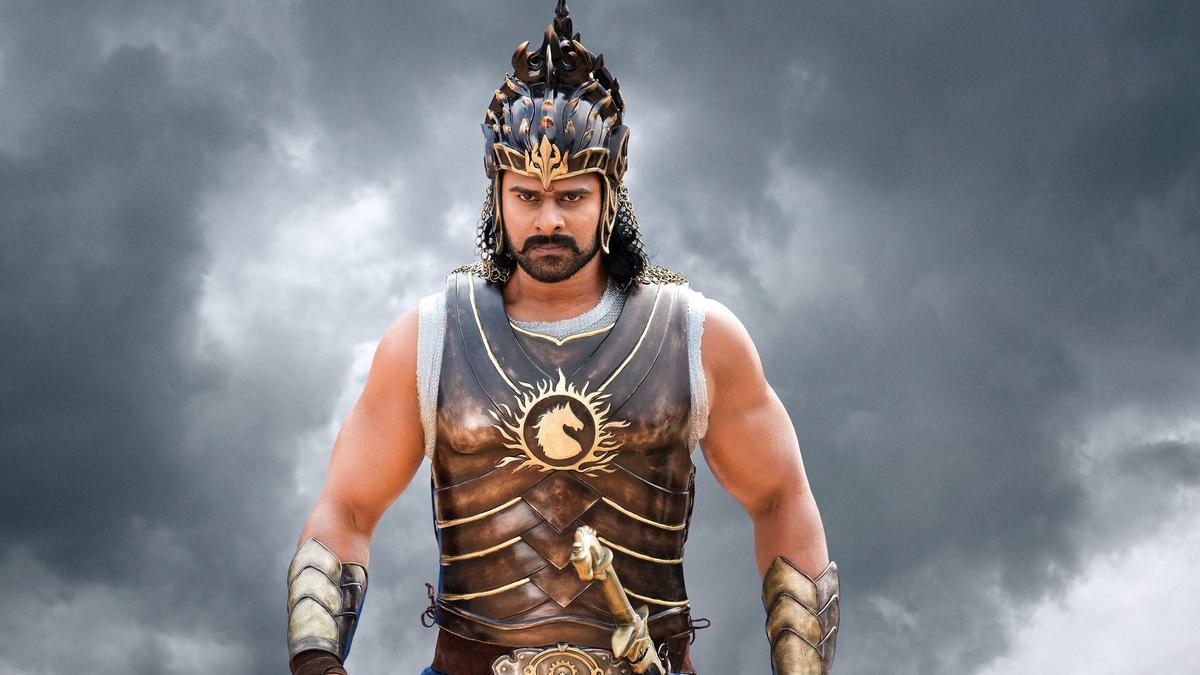To call this a review required careful thought. Strictly speaking, it is a re-release — marking a decade since Baahubali: The Beginning first hit theatres in 2015. But this is no ordinary re-release. After undergoing the required technical upgrades to meet current digital projection standards, the 225-minute-long Baahubali: The Epic arrives as a digitally remastered and re-edited film that condenses both parts of the Baahubali saga into a whole.
A few indulgent stretches have been trimmed, placing the emphasis on storytelling — SS Rajamouli’s greatest strength. In that sense, this new version is an improvement on Baahubali: The Beginning, which had whetted audiences’ appetite for larger-than-life storytelling but famously ended on a cliffhanger. The question — “Why did Kattappa kill Baahubali?” — sparked a two-year wait and one of Indian cinema’s most memorable marketing campaigns.
This time around, Rajamouli acknowledges that anticipation with a touch of humour — a moment best left for audiences to discover in the theatre. Part of the joy of watching a re-release lies in the unrestrained enthusiasm of the viewers, who know every song, dialogue and gesture by heart, joining in as if the film were a live performance. For a phenomenon like Baahubali, still vivid in public memory, that energy feels even greater.
At one pivotal moment, when Prabhas as Mahendra Baahubali asks, “Nenu evarni…” (“Who am I?”), an excited fan shouts back, “India’s biggest superstar.” It’s a response that encapsulates not just the popularity Baahubali continues to command — but the legacy it has carved into Indian cinema.
Baahubali: The Epic (Telugu)
Director: SS Rajamouli
Cast: Prabhas, Rana Daggubati, Anushka Shetty, Ramya Krishna, Sathyaraj
Duration: 225 minutes
Storyline: A young man’s discovery of his royal lineage leads him to reclaim his throne and avenge the injustice to his parents.
Watching the film in Hyderabad, at the iconic Prasads multiplex, is a nostalgic celebration for anyone who remembers the frenzy that accompanied the release of the Baahubali films.
Set in the fictional kingdom of Mahishmati, at an unspecified time period, this homegrown superhero tale is magnificent in scale yet grounded in emotional storytelling. When Sivagami declares, “Mahendra Baahubali brathakali” (“Mahendra Baahubali must live”), the audience joins in chorus.
For the most part, the re-edit ensures that the narrative flows seamlessly. The only rough patch comes in Rajamouli’s voiceover summarising the romance between Avantika (Tamannaah Bhatia) and Shivudu, or Mahendra Baahubali (Prabhas), now reduced to a brief montage. The romance was a weak point even in the original, but trimming it is tricky since Avantika plays a crucial role in Shivudu’s transformation into Mahendra Baahubali. Thankfully, the rushed voiceover is a minor blip in an otherwise immersive experience. A few songs and sections of the Mahishmati–Kalakeya war have also been shortened or removed.
The joy of rewatching Baahubali lies as much in its grandeur as in the smaller moments that build towards it. Take young Shivudu’s fascination with the great waterfall and the mountains beyond. Sivagami breathes her last while pointing towards the mighty kingdom above, and the boy is told that ghosts and demons dwell there. After countless failed attempts, he scales the slippery cliffs when the time is right — a metaphor for self-discovery and destiny. The same daring leap reappears later when he devises ingenious methods to storm Mahishmati’s fortress for the climactic battle against Bhallaladeva (Rana Daggubati).
Mahendra’s knack for using simple, indigenous tools mirrors his father Amarendra Baahubali’s (also Prabhas) ingenuity in the war against the Kalakeyas.
The re-edited version also reinforces how larger-than-life action spectacles can still make space for well-written women. Devasena (Anushka Shetty) and Sivagami are central to the drama. Devasena stands tall in her many confrontations with Sivagami and Bhallaladeva, asserting a woman’s right to choose her partner and live with dignity.
The entire segment featuring Devasena and Amarendra retains its original magic, a testament to how effortlessly Anushka Shetty and Prabhas inhabit their characters. Prabhas himself has not quite replicated the same agility and magnetism in his later roles, nor has Anushka found a part that matches Devasena’s strength and complexity.
Rana Daggubati’s Bhallaladeva is a compelling mix of brute force and quiet yearning — for the throne, and for the woman he could never have. His monologue as he gazes at the long-coveted crown captures both triumph and emptiness. Sathyaraj, as Kattappa — the loyal warrior bound to the throne — delivers a poignant performance in the saga, particularly before he fulfils Sivagami’s devastating command.
The appeal of Baahubali lies in these quieter moments as much as the larger ones — from the statue unveiling to the coronation. Nothing quite matches the grace of Sivagami silently observing her two sons, recognising which one truly deserves the crown.
The passage of a decade shows in some of the visual effects, particularly in the extended landscapes of Mahishmati. Yet, Sabu Cyril’s production design, KK Senthil Kumar’s cinematography, and MM Keeravani’s rousing, soul-stirring music more than make up for it. The lush greens of the Kuntala kingdom contrast beautifully with Mahishmati’s earthen browns, and the swan-shaped ship that soars into the skies with Amarendra and Devasena remains breathtaking even now.
When Devasena watches that same ship glide into Mahishmati’s waters with a sense of foreboding, it is impossible not to share her unease.
The prolonged climax does feel slightly overdrawn, especially given the 225-minute runtime of this re-edited version. Yet when the film ends with a note of gratitude from SS Rajamouli, few in the hall move, not before breaking into another round of applause.
Published – October 31, 2025 05:06 pm IST
